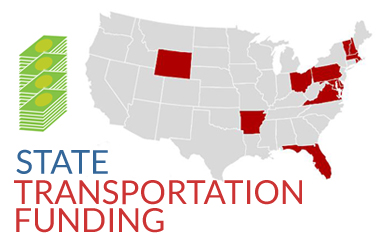
And then there were seven: April update on state transportation funding legislation

A total of seven states have now successfully passed legislation in 2015 to raise new money to invest in transportation, avoid budget shortfalls from declining revenue sources and keep up with growing needs — mostly by voting to raise their state fuel taxes.
Georgia passed a bill that will raise approximately $900 million annually mostly for state highway projects. The bill changes how the state taxes gas, switching from a sales tax on gas purchases to a 26-cents-per-gallon excise tax, indexed to both the change in the average fuel efficiency of all vehicles registered in the state and to inflation (measured by the Consumer Price Index). That double indexing will ensure the new per-gallon tax doesn’t lose future value due to inflation or improved fuel efficiency. The bill also places fees on other services, including a $5-per-night hotel fee, $300 annually in fees for electric cars and $100 annually in fees for heavy trucks. In light of this switch from a sales tax to per-gallon taxes on gasoline, it’s worth noting that Georgia is one of dozens of states with a constitutional prohibition on spending per-gallon gas tax revenues on public transportation.
Georgia counties and cities also won a modified option to raise funds for local transportation needs via additional sales taxes of up to one percent if approved by the county commission and voter referendum. Before this modification, a local option sales tax referendum could only be held on dates and in regions determined by the legislature.
Also worth noting is the passage of a separate bill that finally removes the onerous requirement that MARTA (Atlanta’s regional transit system) could spend no more than 50 percent of its locally-raised revenue to fund operations — essentially the state telling them what they could or couldn’t do with their locally-raised revenues. At one point during negotiations there was a provision that would have allowed the cities and counties that contribute to MARTA to increase the sales tax dedicated to the system by 0.5 percent via ballot measures, but this provision was removed from the final bill.
In North Carolina, legislators passed a bill to raise the minimum gas tax rate of their variable tax to 36 cents per gallon. The gas tax was previously 37.5 cents per gallon but would have dropped below 30 cents per gallon in July, which would have cost the state an estimated $266 million in funding for transportation over the next year.
Kentucky, with a variable tax rate similar to North Carolina, passed a similar bill. The state established a new gas tax minimum of 26 cents per gallon. The new minimum will prevent an estimated $250 million drop in contributions to their transportation fund for the year.
The House and Senate in Idaho both approved raising their gas tax from 25 cents per gallon to 32 cents along with increases to the state’s vehicle fees. The bill will raise an estimated $94 million for maintenance of the state’s roads and bridges. The bill is sitting on Governor Butch Otter’s desk waiting for his signature.
Those states join Iowa, Utah and South Dakota as the seven states that have successfully raised new funds in 2015. With legislative sessions and active proposals still moving in a handful of states, more could still follow this year.
Louisiana legislators have filed several bills to address the state’s transportation issues. One bill would raise the state fuel tax by 4 cents per gallon with new revenue dedicated to parish governments. Another proposal would temporarily raise the state fuel tax by 4 cents per gallon for the next three years. A separate bill would reform the way the state selects highway projects, improving the potential for return on transportation investments while adding transparency and accountability that could boost the prospects of the plans to raise new revenue.
Nebraska’s legislature has advanced a bill to increase their state gas tax by 6 cents per gallon, but Governor Ricketts said he opposes the increase and has called for a study committee to assess the state’s transportation need instead.
Lastly, for any Minnesota funding proposals to have a chance this year, they must pass out of their committees by April 24th. Check back then for results.



